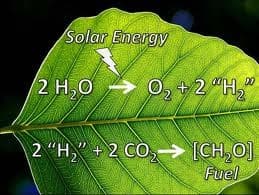Technology for making an “artificial leaf” holds the potential for opening an era of “fast-food energy,” in which people generate their own electricity at home with low-cost equipment perfect for the 3 billion people living in developing countries and even home-owners in the United States. That’s among the prospects emerging from research on a new genre of “electrofuels” described in the current edition of Chemical & Engineering News, the American Chemical Society’s weekly newsmagazine.
In the article, C&EN Senior Correspondent Stephen K. Ritter describes research on electrofuels, made by using energy from the sun and renewable ingredients like water and carbon dioxide, reported at a gathering of experts sponsored by the U. S. Department of Energy’s Advanced Research Projects Agency (ARPA-E). Created in 2009 by the American Recovery & Reinvestment Act, ARPA-E is funding electrofuels research, with the goal of developing technologies that improve on nature’s approach — photosynthesis. Electrofuels is one of 12 programs funded by ARPA-E.
The artificial leaf is one of the electrofuels technologies. Made of inexpensive materials, the leaf breaks down ordinary water into the oxygen and hydrogen that can power an electricity-producing fuel cell. Just drop the credit-card-sized device into a bucket of water and expose it to sunlight. With the cost-conscious technology, one door-sized solar cell and three gallons of water could produce a day’s worth of electricity for a typical American home. The article describes a range of other electrofuel technologies, including ones based on engineered microbes, being developed in the quest for new ways of making fuels.
The American Chemical Society is a non-profit organization chartered by the U.S. Congress. With more than 163,000 members, ACS is the world’s largest scientific society and a global leader in providing access to chemistry-related research through its multiple databases, peer-reviewed journals and scientific conferences. Its main offices are in Washington, D.C., and Columbus, Ohio.
To automatically receive news releases from the American Chemical Society contact [email protected].

